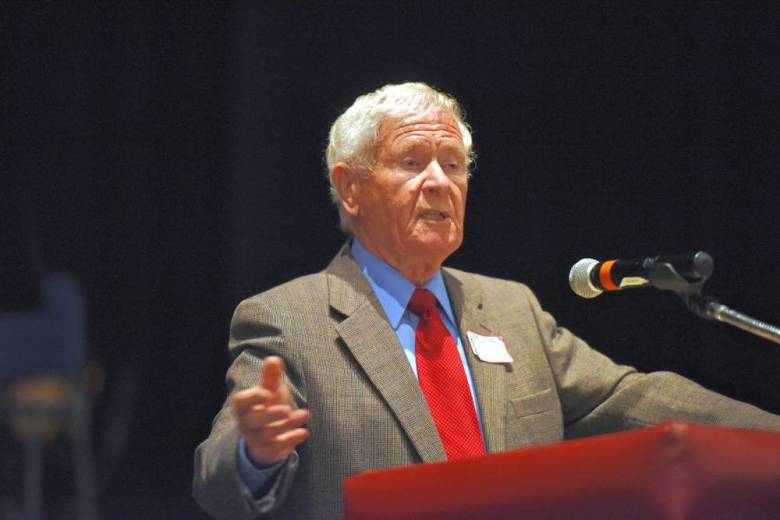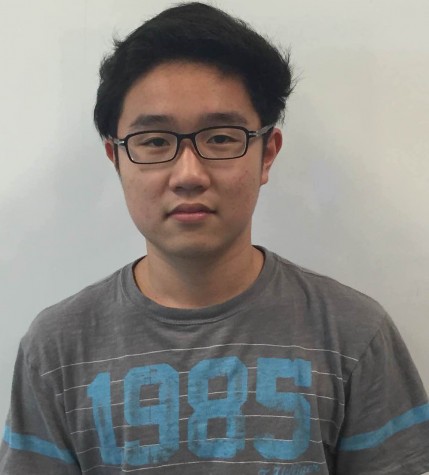Holocaust Survivor speaks at Becton
June 3, 2016
A story of pain, suffering, and survival was told by Holocaust Survivor Abraham Bichler to Becton High School students last Tuesday. Mr. Ryan’s Holocaust and US History classes attended the assembly because Mr. Ryan stated he wished to “legitimize the things” he was trying to teach.
Growing up, Bichler spent most of his life in prison camps. Hungry and cold, he spent 16 years of his life in Europe before escaping to America. He told of how over “70 of his relatives died” during the Holocaust and the never ending pain of hunger he endured for six years straight. Bichler stated “there is nothing worse than hunger”.
Bichler and his family were forced into prison camps, where “people began dying like flies” because of the freezing temperatures, “malaria, and every other disease you could think of.” Bichler told of how he “was unable to stand for over a year” because of the cold. He remembers it being so cold that his grandfather’s beard would form icicles after being soaked in water.
The first to pass away in his family was his 4-year-old sister, Bichler was only 2 years older than his sister, who he described as “the most beautiful baby.” Bichler told of wagons that would come around at night to pick up dead bodies in the street. The camp did not allow the dead to be buried but Bichler’s sister was the first, with the help of Bichler’s grandfather who told Bichler, “They’re not going to do that to your little sister.”
The children in the camp were told to be moved to a different one because they would die too quickly. “Within 6 weeks, 18 thousand people died”, said Bichler. On a list of 1,200 children, Bichler was lucky enough to have been chosen and soon, they were transported to a Siberian labor camp. Bichler was diagnosed with malaria, pneumonia, and a kidney infection, which kept him from working in the labor camp. However, Bichler father was forced to work, loading bricks onto cars. Bichler told how his father would put rags over his shoes and pour water on them to insulate the shoes, which helped his father work 12 through 14 hours a day.
The hunger, as Bichler describes, was the worst pain he felt. He “had to soak the bread in water because it was like a piece of steel. If you tried to bite it, you would break your teeth.” He remembers his mother selling her wedding ring to buy milk, potatoes, and cheese
After World War II had ended, Bichler and his family travelled several thousand miles from Kazakhstan to Poland with the help of soldiers who wielded automatic rifles and helped transport Bichler’s family on cattle cars.
During this trek, Bichler had gotten out of the cattle car he was hiding in to use the bathroom. However, Bichler stated he noticed a policeman and did not know whether the policeman had seen him or not. Terrified, Bichler sneaked back in, only to have the policeman knocking on the car. The military escort then denied to have seen a boy. The policeman became furious and argued with the escort, not noticing an oncoming train. Then suddenly, the policeman was decapitated by the train, allowing Bichler to safely escape.
Rare incidents like these became known to Bichler as ‘little miracles’, which inspired the creation of Bichler’s book titled Little Miracles, “the story of courage, faith, and survival”.
After a three year wait, Bichler got in touch with 3 Kazakhs, in the United States, who helped Bichler travel to the US legally. With only one dollar, Bichler arrived in Boston, Massachusetts at the age of 16. Bichler could not speak a word of English and worked in factories to earn money.
During high school, Bichler could only speak to the principal, who spoke German. The only class Bichler could participate in was math because he could “understand the numbers but not the words.” Bichler loved playing soccer as a child and to his surprise, girls at the high school played soccer, something he had rarely seen in Europe.
He graduated after 2 years of high school, allowing him to pursue his career as a teacher. He attended New York University in 1960, where he earned his master’s degree in history. After, he attended Yeshiva University in 1973, where he earned his doctorate in Hebrew literature and history. This set him on the path of his 36-year career as a teacher in Fair Lawn
Bichler told students that his story was a reminder to “never give up hope” and to “never forget your experiences,” instead he wanted people to learn from them.
Mr. Ryan thanked students for being amazing audiences, stating “These resources are disappearing as time goes along.”
Students appreciated the assembly as many approached Abraham Bichler to ask questions and take pictures.
Sophomore Charlie Flenner stated he enjoyed the assembly because “we were able to hear about this man’s real life experiences directly from the source rather than from reading a textbook interpretation.”
Sophomore Jeremy O’Brien said, “He reminded me that I shouldn’t take things for granted.”
In addition, Abraham Bichler has donated 25 copies of his book, Little Miracles, to Becton Regional High School. Mr. Ryan’s Holocaust class hopes to learn more of history and believe they will be vital learning tools.




